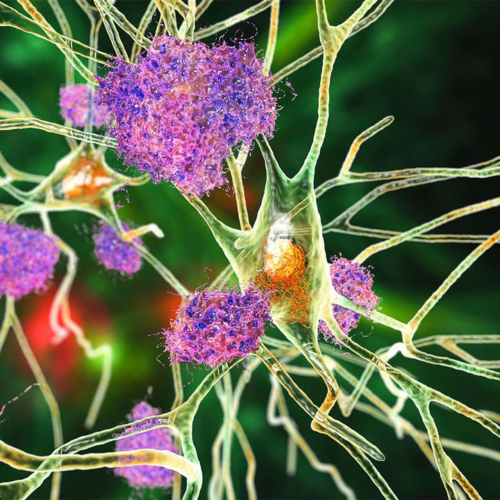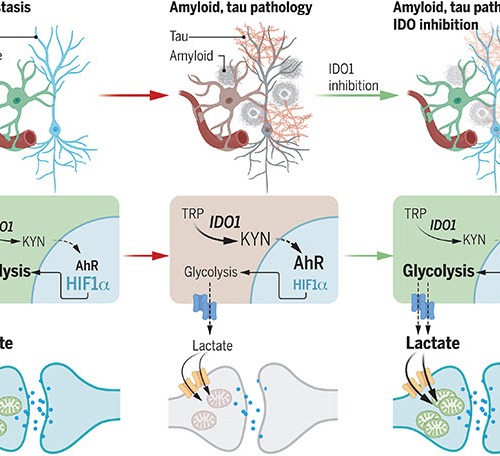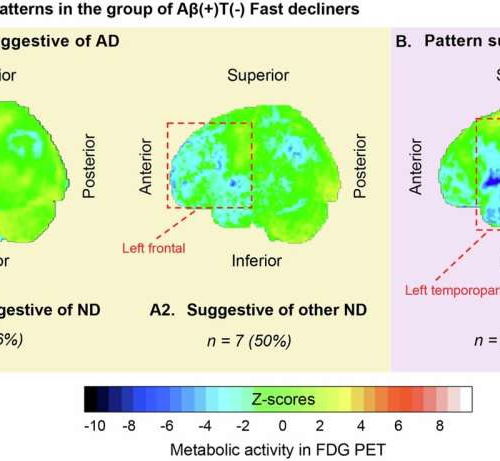September 30, 2024 by Carole Tanzer Miller A synthetic form of the active ingredient in cannabis helps reduce agitation in people with Alzheimer’s, new research shows. Synthetic THC (dronabinol) also gave patients’ caregivers a boost, according to findings presented at a meeting of the International Psychogeriatrics Association in Buenos Aires. The findings may provide encouragement...
Category: <span>Alzheimer’s</span>
New study traces Alzheimer’s ‘pathology clock’ at unprecedented cellular resolution
Vulnerable neurons during the early stages of Alzheimer’s disease. Credit: Allen Institute Researchers at the Allen Institute for Brain Science, UW Medicine, and Kaiser Permanente Washington Health Research Institute have created the most detailed picture yet of how Alzheimer’s disease (AD) progresses at the cellular level. Using advanced single-cell genomic technologies and novel machine learning...
Simple smell and memory test could effectively predict Alzheimer’s
Survival probability for cognitive decline of BIMCT, BSIT, and PIB dichotomized variable combinations. Credit: Alzheimer’s & Dementia (2024). DOI: 10.1002/alz.14261 A new study from Columbia University shows that combining a brief smell test with a short memory exam can predict cognitive decline as accurately as costly brain imaging, offering a more affordable and accessible way to assess...
Scientists validate new lab test platform for blood biomarkers of Alzheimer’s disease
Credit: Pixabay/CC0 Public Domain University of Pittsburgh scientists have independently validated a new blood test platform that can simultaneously measure more than a hundred biomarkers of Alzheimer’s disease. The platform might improve clinicians’ ability to capture the multifaceted nature of Alzheimer’s pathology and streamline early disease diagnostics. The report is published in Molecular Neurodegeneration. “Alzheimer’s disease should not...
New Alzheimer’s studies reveal disease biology, risk for progression and the potential for a novel blood test
September 18, 2024 by Boston University School of Medicine Credit: CC0 Public DomainThe failure to diagnose Alzheimer’s disease—the most common form of dementia in the elderly—at an early stage of molecular pathology is considered a major reason that treatments fail in clinical trials. Previous research to molecularly diagnose Alzheimer’s disease yielded “A/T/N” central biomarkers based...
Boosting brain protein levels may slow decline from Alzheimer’s
September 11, 2024 by University of Cincinnati Credit: Unsplash/CC0 Public DomainA study published in the journal Brain shows that increases in protein levels with new Alzheimer’s drugs can explain the slowing of cognitive impairment at least as well as the reduction in amyloid plaques. During a study challenging the idea that newly approved monoclonal antibodies...
Trauma exposure accelerates brain aging which can lead to Alzheimer’s disease, study suggests
September 10, 2024 by The North American Menopause Society Credit: Human Brain ProjectAs the median age of our population rises, so does the number of people diagnosed with Alzheimer’s disease. With advances in technology, it’s easier to determine brain age and identify blood-based Alzheimer’s disease biomarkers. A new study links trauma exposure with brain age...
Brain Aging Trajectories Identified in Post-Mortem Tissue
— Alzheimer’s may be driven by multicellular communities, analysis suggests by Judy George, Deputy Managing Editor, MedPage TodaySeptember 3, 2024 Key TakeawaysTwo distinct pathways of brain aging emerged in a cellular analysis of post-mortem brain tissue.One trajectory led to Alzheimer’s disease, the other to an alternative brain aging pathway.Cellular communities, not singular cell subpopulations, may...
Could Nixing a Tryptophan Metabolite Temper Alzheimer’s?
06 Sep 2024 Could one tiny little amino acid derivative make Alzheimer’s disease a whole lot worse? In the August 25 Science, researchers led by Katrin Andreasson, Stanford University School of Medicine, report that, in response to oligomers of Aβ or tau, astrocytes produce copious amounts of the tryptophan metabolite kynurenine, which scuppers glycolysis and...
Alzheimer’s study reveals critical differences in memory loss progression based on the presence of specific proteins
September 6, 2024 by Karolinska Institutet Hypometabolism FDG PET patterns in the group of Aβ(+)T(-) fast decliners (14 out of 19 individuals had available FDG PET scans). Credit: Molecular Psychiatry (2024). DOI: 10.1038/s41380-024-02672-9A study from Karolinska Institutet, published in the journal Molecular Psychiatry, offers new insights into the progression of Alzheimer’s disease (AD). The research...






